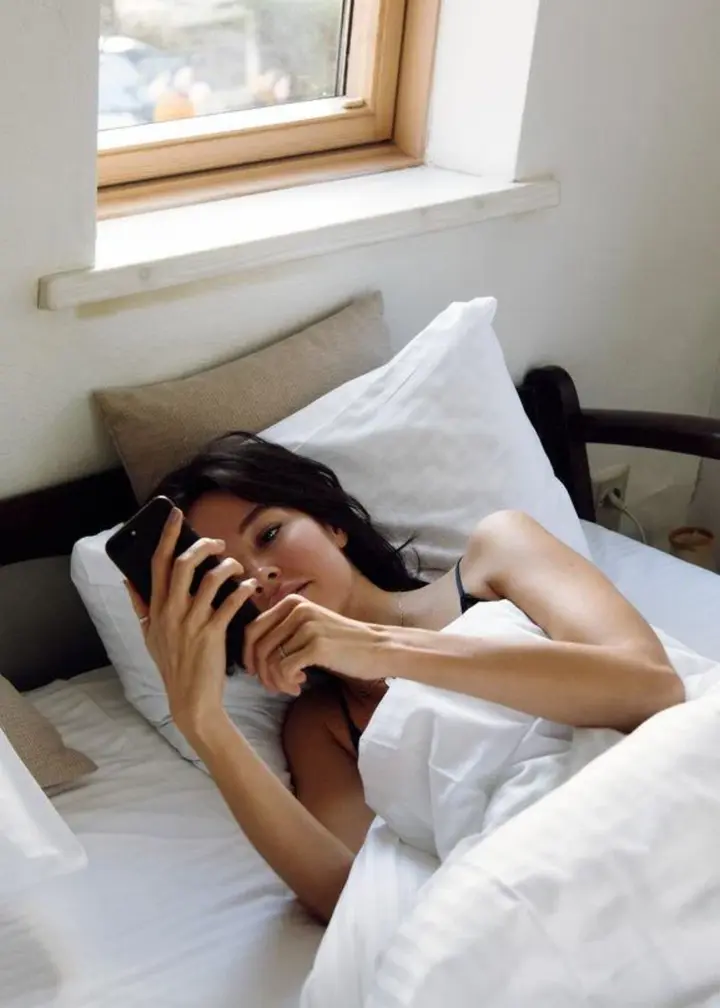
This Is What You Need to Know About Blue Light – and How It Disrupts Your Sleep
Too much blue light is one of the worst ways to sabotage your chances of a good night's sleep – here's why.
Do you use your phone in bed? Texting, streaming, scrolling through Instagram?
We can’t judge you, because we do, too – even though we know that it’s one of the worst things you can do if you want a good night’s sleep.
That’s because the light that comes from phone, tablet and laptop screens is “short-wavelength-enriched”, which means that it has more blue light than other varieties. And it’s blue light that impacts melatonin, the hormone that helps us sleep. According to a 2018 study from the University of Glasgow, those who used their phones in bed late at night were also more likely to have insomnia and anxiety.
So what is it that makes blue light so bad? Well, to understand that, you need to understand what your body’s natural circadian rhythm is. We’re talking about the biological process that kickstarts your sleep cycle, secretes sleep-inducing melatonin and reminds you when it’s time to nod off. When your circadian rhythm is healthy, you’ll feel sleepy at around the same time each day, usually in the mid to late evening.
But if you’re having too much screen time, especially at night, then your natural circadian rhythm will be thrown off and interrupted. This, in turn, will lead to a poor quality sleep and a feeling of restlessness and exhaustion the next day. And when we say screen time, we mean almost everything, from iPads and other tablets to smartphones and laptops. The only exception to the rule is the Kindle, which doesn’t emit any blue light and functions more as a traditional paper book than a piece of technology when it comes to light levels.
Experts recommend conducting a bit of a sleep cleanse to assess your late-night screen habits. Some, like Arianna Huffington, put their phones in a symbolic bed in another room, signifying that it’s time to go to sleep, and don’t pick it back up until the next morning. Others suggest that switching off all technology at 10PM will help you have a restful night’s sleep.
The point is to take a look at your habits and see where screentime can be eliminated or, if not, reduced. Instead of lying on your side binge-watching Netflix on a tiny iPhone screen in pitch darkness, how about sit up on the couch and watch television the old fashioned way? And do you really need to be taking your laptop into bed with you to work on that presentation? Do you?
There is also school of thought that says that a little bit of blue light isn’t harmful at all. It’s about looking at the effect of blue light – sleep disruption, anxiety – and comparing and contrasting it with the effect of not having that screen time. So, for example, if you are an anxious person who feels calmed before sleep by watching a little bit of television or looking at Instagram stories (no judgement, remember), then which is worse: not watching television and spending a few hours restless in bed, or watching it for less than an hour and being able to get to sleep easily?
On balance, in situations like this, a little bit of blue light goes a long way. The problems emerge when you begin spending too much time in the evenings taking in blue light through screens. The build up of this over time can seriously impact your sleep cycles, and can be hard to undo.
Take stock of your evening screen time and plan ways to reduce it. If you’re a late-night emailer, why not shift that habit to the morning. If you find it hard to put down your phone if it’s within arm’s reach, then put your charger outside the bedroom where you can’t see it. But if you desperately need to watch that episode of The White Lotus before bed, then don’t deprive yourself. Maybe compromise by watching it in the living room, though.
These are little changes you can make to eliminate some of the blue light in your bedroom. Your sleep cycle, and your sanity, will thank you later.
This article is intended for informational purposes only and is not a substitute for individualised health advice. If you are concerned about your health and well-being, please speak to your GP, who will advise on the correct treatment plan. You can also call Lifeline 24/7 for mental health support on 988.
Create a Sleep Sanctuary
Enjoyed This?
Discover more sleep tips.















